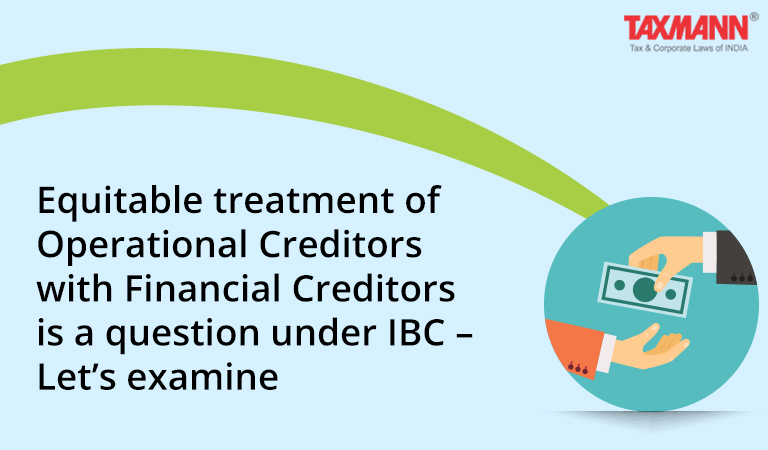Equitable treatment of Operational Creditors with Financial Creditors is a question under IBC – Let’s examine
- News|Blog|Insolvency and Bankruptcy Code|
- 2 Min Read
- By Taxmann
- |
- Last Updated on 20 November, 2021

[2021] 132 taxmann.com 163 (Article)
The stated object and purpose of the IBC is to balance the interest of all stakeholders. Any law provides for equitable treatment. However, in IBC it appears to be a question. Lets examine, based on the analysis of the Hon’ble Supreme Court decision in the matter of Pratap Technocrats (P.) Ltd. v. Monitoring Committee of Reliance Infratel Ltd.
Meaning of Operational Creditors
In brief, when any amount due to the vendors, service providers, workmen and employees, they are considered as operational creditors.
They cannot vote in the resolution plan.
Meaning of Financial Creditors
It means to whom a financial debt is owed. Financial debt is generally mean when money is borrowed from banks, financial institutions or any other lenders with the terms that it will be paid within a certain period of time with specified terms and conditions.
In the instant case, Reliance Infratel Limited has borrowed certain amount from banks. Hence, banks are the financial creditors.
Resolution process
It appears that Reliance Infratel Limited has failed to make payment to the financial creditors as well as the operational creditors, hence, resolution process was initiated under the IBC Code.
Impugned Order
The order of the NCLAT dated 4th January 2021 was challenged before the Hon’ble Supreme Court.
Vide this order, the NCLAT has upheld the order dated 3rd December 2021 of the NCLT, Mumbai whereby a resolution plan was approved in the course of the insolvency resolution process.
Brief facts
Reliance Infratel Limited was the Corporate Debtor, as it fails to make payment to the financial and operational creditors.
Resolution plans were received from the following applicants –
i. Bharti Airtel Ltd.;
ii. Reliance Digital Platform & Project Services Limited, through its division Infrastructure Projects;
iii. VFSI Holdings Pte. Ltd.; and
iv. UV Asset Construction Company Ltd.
Out of the above, the resolution plan submitted by Reliance Digital Platform & Project Services Limited was approved by the Committee of Creditors.
Click Here To Read The Full Article
Disclaimer: The content/information published on the website is only for general information of the user and shall not be construed as legal advice. While the Taxmann has exercised reasonable efforts to ensure the veracity of information/content published, Taxmann shall be under no liability in any manner whatsoever for incorrect information, if any.

Taxmann Publications has a dedicated in-house Research & Editorial Team. This team consists of a team of Chartered Accountants, Company Secretaries, and Lawyers. This team works under the guidance and supervision of editor-in-chief Mr Rakesh Bhargava.
The Research and Editorial Team is responsible for developing reliable and accurate content for the readers. The team follows the six-sigma approach to achieve the benchmark of zero error in its publications and research platforms. The team ensures that the following publication guidelines are thoroughly followed while developing the content:
- The statutory material is obtained only from the authorized and reliable sources
- All the latest developments in the judicial and legislative fields are covered
- Prepare the analytical write-ups on current, controversial, and important issues to help the readers to understand the concept and its implications
- Every content published by Taxmann is complete, accurate and lucid
- All evidence-based statements are supported with proper reference to Section, Circular No., Notification No. or citations
- The golden rules of grammar, style and consistency are thoroughly followed
- Font and size that’s easy to read and remain consistent across all imprint and digital publications are applied



 CA | CS | CMA
CA | CS | CMA
